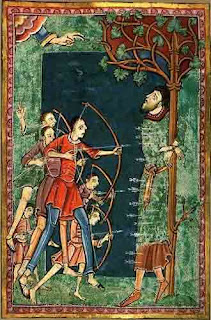November 20
 Edmund the Martyr, King of East Anglia, was killed by Danish invaders -- forces of the Great Heathen Army -- on this date in the year 869. Led by Ivar the Boneless and Hubba Ragnarson, the Danes captured Edmund in battle; before killing him the, they insisted Edmund renounce his Catholic faith, which -- as a proper candidate for martyrdom -- he did not do. Accoring to Edmund’s earliest biographer, events quickly took a turn for the worse:
Edmund the Martyr, King of East Anglia, was killed by Danish invaders -- forces of the Great Heathen Army -- on this date in the year 869. Led by Ivar the Boneless and Hubba Ragnarson, the Danes captured Edmund in battle; before killing him the, they insisted Edmund renounce his Catholic faith, which -- as a proper candidate for martyrdom -- he did not do. Accoring to Edmund’s earliest biographer, events quickly took a turn for the worse:Then those wicked men bound Edmund and shamefully insulted him and beat him with clubs, and afterwards they led the faithful king to an earth–fast tree and tied him to it with hard bonds, and afterwards scourged him a long while with whips, and among the blows he was always calling the true faith of Jesus Christ. Then the heathen were madly angry because of his faith, because he called upon Christ to help him.More than 800 years later, in 1695, Zumbi -- the great Afro-Brazilian folk hero -- was captured and beheaded by Portugese forces, bringing a conclusion to nearly 70 years of resistance from the maroon community of Palmares.
They shot at him with javelins as if for their amusement, until he was all beset with their shots, as with a porcupine's bristles, even as Sebastian was. When Hingwar, the wicked seaman, saw that the noble king would not deny Christ, but with steadfast faith ever called upon Him, he commanded men to behead him, and the heathen did so. For while he was yet calling upon Christ, the heathen drew away the saint to slay him, and struck off his head with a single blow, and his soul departed joyfully to Christ.
Located in an inaccessible region of Northeastern Brazil, tucked behind the mountains that divided the coastal settlements from the continental interior, Palmares had drawn tens of thousands of fugitive Angolans during the 17th century. Enslaved by the Portugese, the Angolans fled the sugar plantations and established one of the largest maroon settlements in the Western hemisphere. With as many as 30,000 inhabitants by 1650, Palmares was able to withstand Portugese conquest for decades. Zumbi, born in 1655, grew up to be the fugitive kingdom’s most renowned military leaders.
For fifteen years beginning around 1680, Zumbi and his forces bedeviled the Portugese. In November 1695, however, his fortune came to an end when he was betrayed by a fellow fighter and taken captive by the Portugese, who beheaded him on the spot.
Lofting his head to the coastal town of Recife, the Portugese displayed it in the central plaza as proof of Zumbi's mortality.
Labels: martyrs